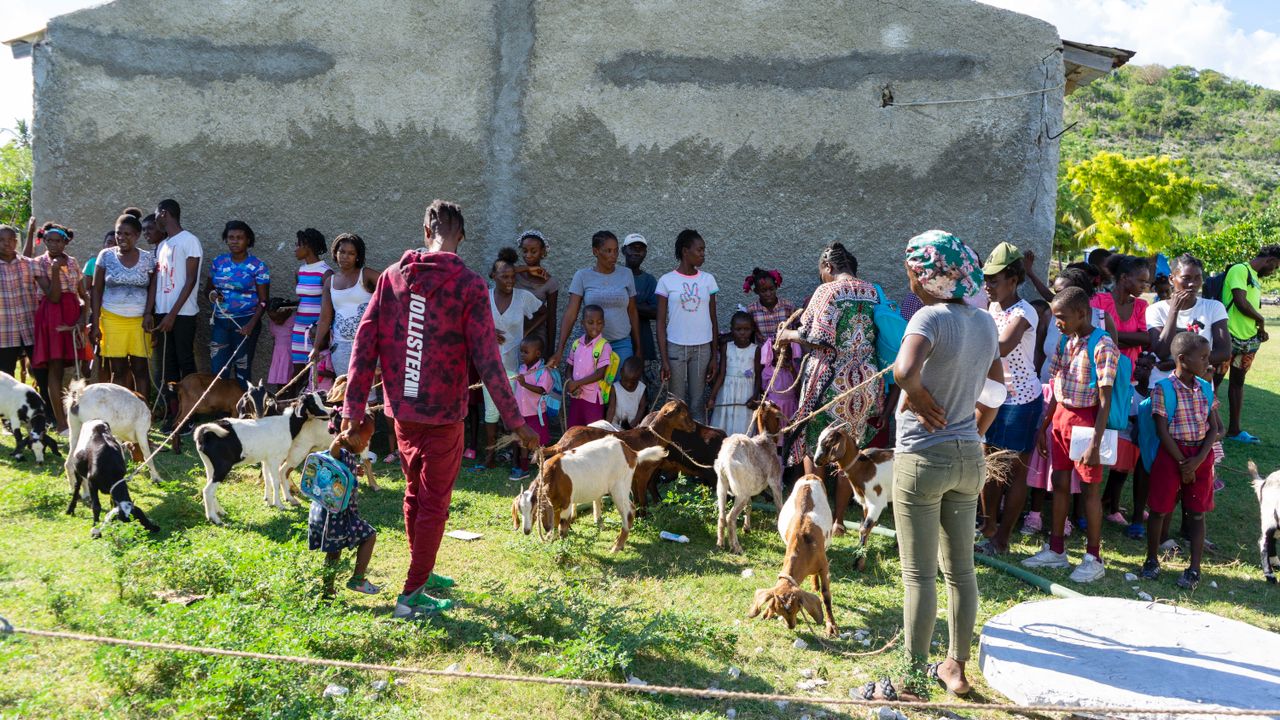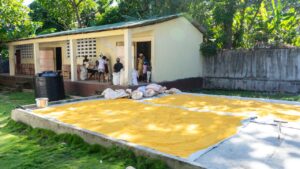Earthquake recovery and resilience in Grand Sud, Haiti

“We’ve never had hope on the island…we’re experiencing things now that will make us very happy. This project will help us get through the difficult times we were in.”
– Dunancia Joseph,
Member of ASA school community whose family received a goat from the school
On Aug. 14, 2021, a devastating 7.2 magnitude earthquake struck southwestern Haiti. More than 2,200 people died, and nearly 13,000 were injured. Schools and other vital infrastructure were destroyed, and an estimated 130,000 houses collapsed.
In December 2021, the Center for Disaster Philanthropy awarded Haiti Development Institute (HDI) a grant from the CDP Haiti Earthquake Recovery Fund to bring resources to earthquake-affected communities through local organizations to equip and empower them to help people cope, recover and rebuild livelihoods and infrastructure, and increase capacity to plan and manage future disaster risk. HDI aimed to ensure that affected communities were engaged in the disaster response as agents rather than objects of development assistance.
Activities supported by CDP funding included disbursing $125,000 in grants to local Haitian-led organizations in the affected area to fund recovery projects such as housing construction, repairing and rebuilding of community assets like schools, clinics and agricultural infrastructure, and agricultural productivity programs to enable those affected to recover their livelihoods.
One of HDI’s grantees was the Association Solidarité Aquinoise (ASA), a local organization that runs a school supporting the education of local community children in an extremely remote, economically disadvantaged area. ASA implemented a project to provide goats and training in goat husbandry to families in the community to give them an additional source of income.
The goats and technical assistance in raising them not only gave families an income-producing asset but also helped sustain the work of ASA, which supports the local school by providing it an ongoing source of revenue from school fees that local families can now pay, building its financial sustainability.

Another HDI grantee, Konbit Famn Kaskad Dibrèy (KOFAKAD), operates a facility that purchases agricultural products to supply larger purchasers, including the Bureau Nationale du Developpement, which works with the World Food Programme to operate school feeding programs. KOFAKAD purchases and sells fresh, perishable food and dries, cleans, packages and stores non-perishable products to supply to larger purchasers.
Smallholder farmers in rural Haiti produce relatively small amounts of perishable and non-perishable products and lack better options than to sell the products immediately to consumers at the local market for low prices. Farmers often do not have access to larger markets or facilities to process, conserve or add value to what they have produced. Meanwhile, larger buyers lack practical sources of local products at scale. KOFAKAD fills the role of middle market aggregator and can grow to meet existing demand.
KOFAKAD connects smallholder farmers to better markets and helps them increase their incomes. It also operates credit and savings groups to help farmers access funding to support their production. The organization is run by women and prioritizes women in employment and savings groups.
CDP believes that after a disaster, the best solutions are local ones from local leaders. Share on XWe proudly support HDI’s efforts to help earthquake-affected communities by empowering local organizations to meet needs and fund recovery. Many of the interventions HDI supports build resilience and self-sufficiency in disaster-affected communities. They are supporting organizations and programs delivering impact now and also investing in building the foundations of long-term progress.
Story by Ruja Entcheva